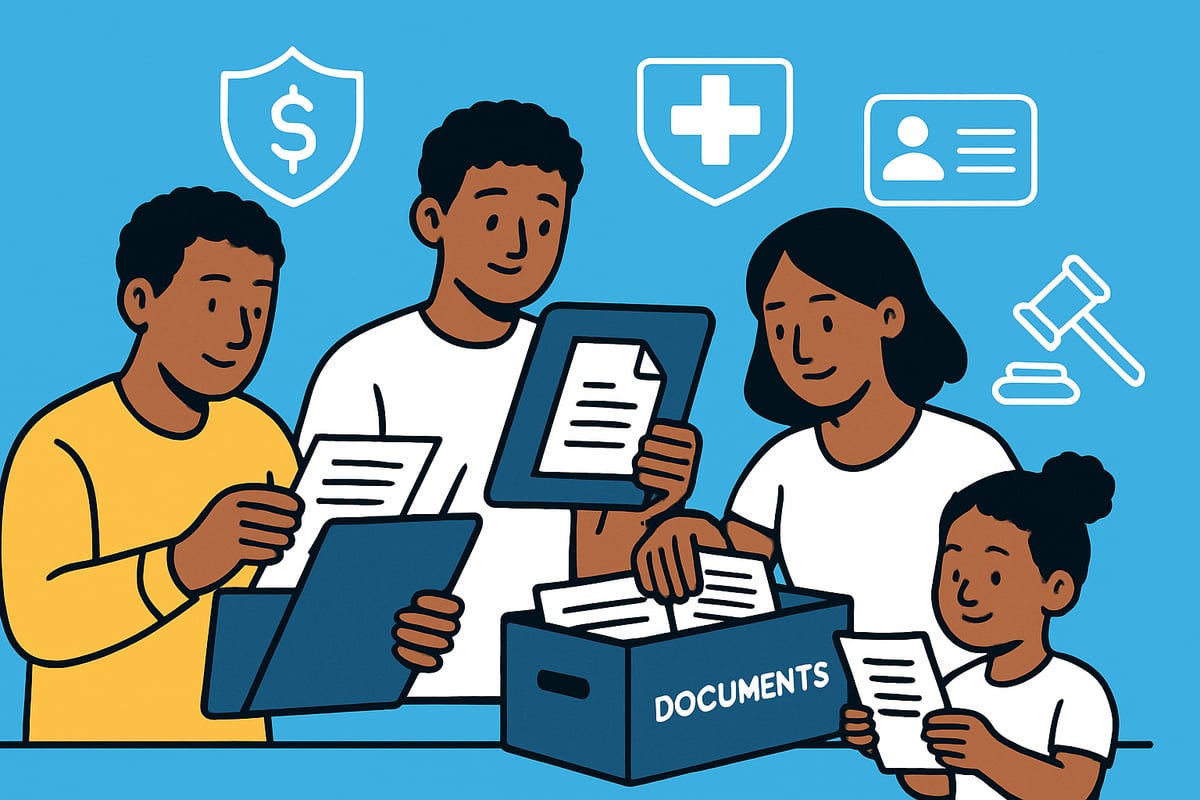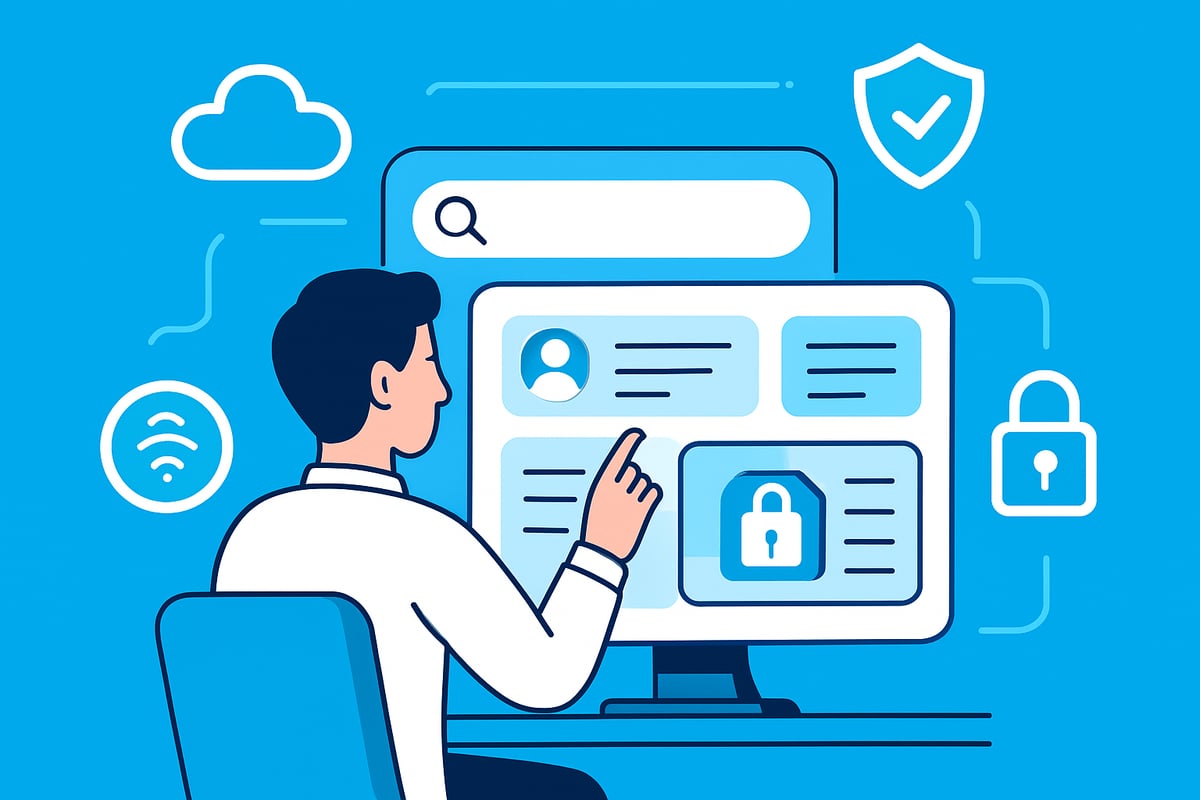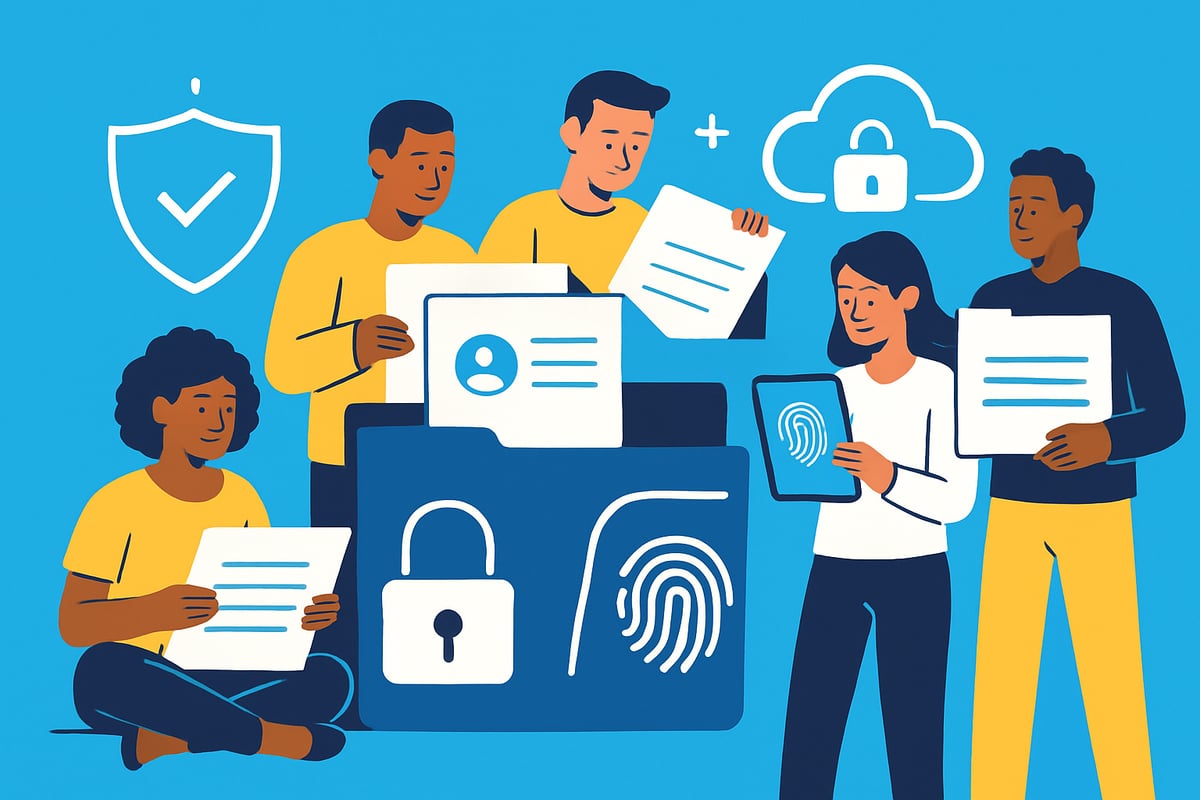Imagine facing an emergency and needing to instantly search personal information. Would you know exactly where to look or what to do? In 2025, the challenge has grown as our lives become more digital, with sensitive data scattered across accounts, devices, and clouds.
This guide will walk you through how to search personal information efficiently, organize it for quick access, and keep it secure. Learn about the impact of new privacy laws, the latest digital tools, and the best strategies to safeguard your most important data. Take control and gain peace of mind with expert guidance.
Understanding Personal Information in 2025
Personal information is at the core of our digital identities. In 2025, knowing how to search personal information is a vital skill for anyone wanting to stay organized, secure, and prepared for life’s surprises.

Defining Personal Information Today
Personal information in 2025 covers far more than just your name or address. It now includes sensitive data like personally identifiable information (PII), digital footprints, and even biometric identifiers such as fingerprints or facial recognition scans.
The rise of IoT and smart devices has expanded what we need to track. Health trackers monitor your steps and heart rate, smart home logs capture daily routines, and online accounts store everything from purchase history to medical records. When you search personal information today, you're navigating a vast and ever-growing landscape.
The Digital Footprint Explosion
On average, people now juggle over 100 digital accounts, from banking and shopping to social media and streaming platforms. This explosion of digital touchpoints makes it harder than ever to keep track of where your data lives.
Cloud storage, subscription services, and an endless array of apps mean your digital footprint grows daily. To effectively search personal information across these platforms, you need organized systems and a keen awareness of your digital presence.
| Year | Average Digital Accounts per User |
|---|---|
| 2023 | 100+ |
| 2025 | Projected 120+ |
Staying organized is no longer optional—it's essential for control and peace of mind.
Legal and Regulatory Landscape
Privacy laws have evolved rapidly. Regulations like GDPR and CCPA set the groundwork, but new rules in 2025 demand even more transparency and protection for your data.
Individuals must now be proactive about how they search personal information and handle it, both online and offline. Organizations face stricter requirements for data storage and must provide easier access and deletion options for users. These changes affect how quickly and securely you can retrieve your own records.
Understanding your rights and responsibilities helps you avoid legal pitfalls and ensures your data remains accessible when you need it most.
Risks of Unmanaged Personal Information
Failing to manage or regularly search personal information can have severe consequences. Identity theft is on the rise, with millions of cases reported each year. According to recent identity theft statistics 2025, the financial and emotional toll on victims continues to climb.
Data breaches can lead to stolen funds, damaged credit, and months of stress. Real-life stories show that misplaced or outdated information can delay crucial decisions or even put loved ones at risk. Proactive organization and regular checks are your best defense.
Why Search Personal Information Matters
There are countless reasons to routinely search personal information. Estate planning, emergency situations, and even day-to-day management all depend on quick access to accurate records.
Case studies reveal families unable to locate essential documents during crises, adding unnecessary stress to already difficult times. When you search personal information and keep it organized, you gain peace of mind and ensure you’re ready for whatever life brings next.
Step-by-Step Guide to Searching Personal Information
Navigating the process to search personal information can feel overwhelming, but breaking it down into clear steps makes it manageable. This guide walks you through each phase, ensuring you cover every critical detail for 2025.

Step 1: Identify Information Categories
To efficiently search personal information, start by mapping out the main categories you need to track. Common areas include:
- Financial (bank accounts, investments, tax records)
- Medical (insurance cards, vaccination records, prescriptions)
- Legal (wills, deeds, power of attorney)
- Digital (email accounts, subscriptions, digital assets)
- Household (utility bills, warranties, appliance manuals)
A master list or table can help clarify what you have and what might be missing. Here’s a simple template:
| Category | Examples |
|---|---|
| Financial | Bank statements, credit cards |
| Medical | Health records, insurance details |
| Legal | Birth certificates, wills |
| Digital | Account logins, cloud backups |
| Household | Lease agreements, receipts |
Creating this overview is the first step to search personal information systematically.
Step 2: Locate Physical Documents
Many people still keep vital records in physical form. To search personal information offline, check these common locations:
- Filing cabinets or folders in your home office
- Safes or lockboxes for sensitive documents
- Drawers, closets, or storage bins for older paperwork
If you cannot find a document, retrace your steps and think about past moves or reorganizations. Consider making a list of everything stored in each location. Group similar documents together so that future searches are less stressful. This approach speeds up your ability to search personal information when time is critical.
Step 3: Search Digital Records
Most personal data now exists in digital formats. To search personal information stored electronically, use device search functions, cloud storage platforms, and email archives. Start by searching for keywords related to the document’s name or type.
Popular platforms include Google Drive, Dropbox, and iCloud. Each has a search bar to help you quickly locate files. For more tips on managing and retrieving digital files, check out these Digital Record Keeping Tips.
Don’t forget to look in old email attachments, downloads folders, and backup drives. Consistently naming files and folders improves your ability to search personal information across devices.
Step 4: Access Online Accounts and Passwords
With so many online accounts, retrieving personal data can be tricky. To search personal information in accounts, use a password manager to organize logins and notes. If you’ve forgotten a password, use account recovery options, which often involve multi-factor authentication.
Keep your password manager up to date. Regularly test your ability to access critical accounts. Make a list of your most important logins, and ensure someone you trust knows how to access them in an emergency. This step helps you search personal information even when you’re locked out or need to act quickly.
Step 5: Verify and Update Information
After gathering documents, review and confirm their accuracy. Cross-check key details like names, dates, and account numbers. Remove outdated, duplicate, or irrelevant records.
Set reminders to revisit your files quarterly or annually. Keeping your information current means the next time you need to search personal information, you’ll spend less time and avoid confusion.
Step 6: Document and Organize Findings
Centralize everything you’ve found into one directory, binder, or secure digital folder. Use spreadsheets, apps, or a simple checklist to track what you have. For digital storage, consider folders by category or year.
Best practices include labeling files clearly, setting up color-coded folders, and creating a backup plan. The more organized you are, the easier it becomes to search personal information for any purpose, whether it’s for taxes, emergencies, or routine management.
Step 7: Secure and Share Appropriately
Finally, protect your data from unauthorized access. Use encryption for sensitive files and store physical documents in a locked safe. Only share information with trusted people, and never over-email or overshare sensitive attachments.
Set up emergency access protocols, so family members or executors can search personal information if you’re unavailable. Regularly review who has access and update permissions as needed. Proper security ensures your information is both safe and accessible when required.
Digital Tools and Solutions for Personal Information Search
Navigating the digital world in 2025 means using the right tools to search personal information quickly and securely. With so much data spread across devices and platforms, the right solutions can save you time, stress, and even money.

Modern Search Software and Apps
The landscape of software to search personal information has dramatically improved. Password managers, digital vaults, and document organizers like 1Password, Dashlane, and Evernote offer powerful search capabilities. These tools let you quickly locate passwords, IDs, and sensitive files across all your devices.
Key features to look for include:
- Advanced search filters
- Secure cross-device syncing
- Intuitive categorization
Using these apps can cut search time in half. For more strategies on keeping personal information organized and accessible, see Keeping Personal Information Organized.
Cloud Storage and Backup Solutions
Cloud platforms make it easier than ever to search personal information on demand. Services like Google Drive, OneDrive, and Dropbox provide automated backups and robust file search functions. The growth in cloud adoption is undeniable, with 94% of enterprises using cloud services in 2023.
Compare major cloud platforms:
| Platform | Search Features | Security Level |
|---|---|---|
| Google Drive | Advanced, fast | High |
| OneDrive | Integrated, reliable | High |
| Dropbox | Smart, intuitive | High |
Choose a platform that aligns with your privacy needs and makes document retrieval effortless.
AI and Smart Assistants in Information Retrieval
Artificial intelligence now plays a huge role in how we search personal information. Smart assistants like Siri, Google Assistant, and Alexa can locate files, set reminders, and categorize data just by voice command. AI-powered search tools even suggest files based on context and past behavior.
However, privacy remains a top concern. Always verify which data your assistant accesses and set up strict permissions. Use AI as a helper, not a sole gatekeeper, for your important records.
Security and Privacy Features
Robust security is essential when you search personal information online. Top tools offer end-to-end encryption, two-factor authentication, and secure sharing options. Look for platforms that comply with standards like GDPR and CCPA, and check for regular security audits.
Case studies show that strong security features can prevent data breaches and identity theft. Always enable the highest security settings available and educate yourself on your chosen tool’s privacy controls.
Limitations and Pitfalls of Digital Tools
No digital tool is perfect for every way you search personal information. Over-reliance on technology can lead to issues, like lost passwords or service outages. Compatibility problems may arise when migrating data between platforms.
To avoid pitfalls:
- Keep paper backups for vital records
- Use multiple tools for redundancy
- Test your recovery options regularly
A balanced approach ensures your personal information remains accessible, organized, and secure, even if tech fails.
Privacy, Security, and Ethical Considerations
Digital life in 2025 means your personal information is everywhere, and so are the risks. To search personal information safely and responsibly, you need to understand the privacy landscape, your legal rights, and the best ways to protect yourself and your loved ones.

Protecting Your Personal Information
Keeping your data safe is a top priority when you search personal information. Threats are everywhere, from phishing emails to malware and unauthorized access. In 2025, identity theft cases remain high, with Identity theft facts and statistics 2025 revealing millions of reported incidents every year.
To defend yourself:
- Use strong, unique passwords for each account.
- Enable two-factor authentication wherever possible.
- Regularly update devices and software.
- Store sensitive documents in encrypted drives or secure physical locations.
Learning from recent breaches, it is clear that vigilance and good habits are your best defense.
Legal Rights and Responsibilities
As you search personal information, knowing your rights under privacy laws is essential. The GDPR, CCPA, and new 2025 regulations give you the power to access, correct, or delete your personal data. If you manage information for someone else, such as under a power of attorney, you must protect their privacy as carefully as your own.
Non-compliance can result in serious penalties, both financial and legal. Always:
- Request updates or corrections from service providers when needed.
- Keep documentation of consent and actions taken.
- Understand the specific rules in your region for handling and storing personal information.
Ethical Use and Sharing of Personal Data
Ethics matter when you search personal information, especially if you are sharing it with family, professionals, or caregivers. Always ask for consent before disclosing sensitive data, and be transparent about how it will be used.
Consider these scenarios:
- Sharing medical information with healthcare providers.
- Giving a trusted family member access to financial accounts.
- Managing a loved one's data during a legal transition.
Respecting privacy strengthens trust and prevents misunderstandings. Only share what is necessary, and always prioritize security.
Balancing Accessibility and Security
A common challenge is ensuring that loved ones can search personal information in an emergency without compromising security. Too much restriction can make critical data unreachable, while too little can open doors to fraud.
Strategies for balance include:
- Using secure password managers with emergency access features.
- Storing backup copies of vital documents in a safe location known to key contacts.
- Setting clear guidelines for who can access what and under which circumstances.
This approach helps maintain both peace of mind and robust protection.
Future Trends in Privacy and Security
The way we search personal information will keep evolving as new technologies emerge. Blockchain and biometric authentication are becoming more common, offering stronger safeguards against unauthorized access.
Looking ahead, expect more regulations aimed at empowering individuals and protecting their data. Preparing for the future means:
- Staying informed about new security tools.
- Adapting to changes in privacy laws.
- Remaining proactive in updating your data management practices.
By anticipating these trends, you will be ready to search personal information securely, no matter what comes next.
Best Practices for Organizing and Maintaining Personal Information
Keeping your personal information organized is essential for peace of mind and fast access when it matters most. As you search personal information, a few tried-and-true habits can make all the difference in reducing stress and ensuring your data is always up to date.
Creating a Personal Information Inventory
To effectively search personal information, start by building a comprehensive inventory. List out all essential data categories: identification, financial records, medical documents, legal papers, and digital account details. Use checklists or templates to ensure nothing is missed. For inspiration, review Essential Documents for Families to see what critical paperwork you should include in your inventory.
Break down your inventory into manageable sections. A simple spreadsheet or document with clear labels helps you track what you have and what needs to be found. This approach saves time and reduces anxiety during stressful moments.
Regular Reviews and Updates
Once you search personal information and create your inventory, commit to regular reviews. Outdated information can be just as risky as missing information. Schedule periodic check-ins—quarterly or annually—to confirm everything is accurate and reflects your current life situation.
Set calendar reminders or use digital tools that prompt you when it’s time to review. During these sessions, update addresses, beneficiary designations, and account details. Staying proactive prevents surprises and keeps your information trustworthy.
Secure Storage Solutions
Security is a top priority when you search personal information for storage. Choose a mix of digital and physical solutions to fit your needs. Digital vaults and encrypted drives are ideal for sensitive files, while physical safes protect original documents.
Compare your options in a simple table:
| Storage Method | Pros | Cons |
|---|---|---|
| Digital Vault | Accessible, secure | Vulnerable to hacks |
| Encrypted Drive | High security | Needs password |
| Physical Safe | Disaster-proof | Limited access |
Balance your desire for convenience with the need for robust protection. Share storage locations or access instructions only with trusted individuals.
Educating Family Members and Trusted Contacts
A crucial part of the process is making sure others can search personal information if needed. Host a short training session with family or trusted contacts to walk through your organization system. Share step-by-step guides or written instructions so they can confidently find what they need.
Consider reading The Stress of Searching for Documents for real-life examples of why proactive communication matters. Keeping everyone informed ensures smooth transitions during emergencies and creates a safety net for your loved ones.
Frequently Asked Questions About Searching Personal Information
When it comes to search personal information, people often face recurring concerns. Here, we answer the most common questions to help you organize, secure, and maintain your vital data with confidence.
What Is the Easiest Way to Find All My Personal Information?
The easiest way to search personal information is to use a combination of digital tools and manual methods. Start by creating a master list of your important data categories, such as financial, medical, and online accounts. Password managers and document organizers let you store and search information quickly.
If you prefer manual methods, use color-coded folders or binders for physical documents and spreadsheets for digital records. Digital solutions offer speed and cross-device access, while manual systems provide control and privacy. Choose the method that best fits your comfort level and tech skills.
How Can I Ensure My Information Is Secure While Searching?
Security is crucial when you search personal information, especially given the rise in identity theft cases. Use strong, unique passwords for each account and enable two-factor authentication where possible. Always access your data on secure, private networks.
Be cautious of phishing attempts and never share sensitive details through unverified channels. According to Identity theft statistics 2024, millions of Americans face identity theft each year, emphasizing the need for vigilance. Use security checklists to stay protected and consider encrypted storage for sensitive files.
What Should I Do If I Can’t Find Critical Documents?
If you cannot locate important documents while you search personal information, start by retracing your steps. Check common storage spots like safes, filing cabinets, and digital folders. If records are still missing, contact relevant organizations such as banks, hospitals, or government agencies for replacements.
You may need to provide proof of identity or complete recovery forms. For legal documents like wills or deeds, consult with an attorney for guidance on reissuing them. Creating a backup system now will help prevent future losses and reduce stress during emergencies.
How Often Should I Review and Update My Personal Information?
Experts recommend you review and update your records as you search personal information at least once a year. For critical data like insurance policies or beneficiary designations, consider quarterly checks. Set calendar reminders or use automatic audit tools to stay on track.
Signs that it is time to update include life changes such as moving, marriage, or new accounts. Regular reviews keep your information accurate and ready for any situation, giving you peace of mind and saving time in the long run.
Now that we’ve explored how searching for personal information is more complex in 2025—and why staying organized is essential for your peace of mind—you might be wondering how to put these ideas into action. I get it, keeping track of everything from accounts to insurance can feel overwhelming. That’s where a simple, all-in-one solution really shines. The Family Binder lets you gather, organize, and secure all your important details in one editable PDF, ready whenever you or your loved ones need it most. If you’re ready to make life easier and stress less about searching, Download Now.

